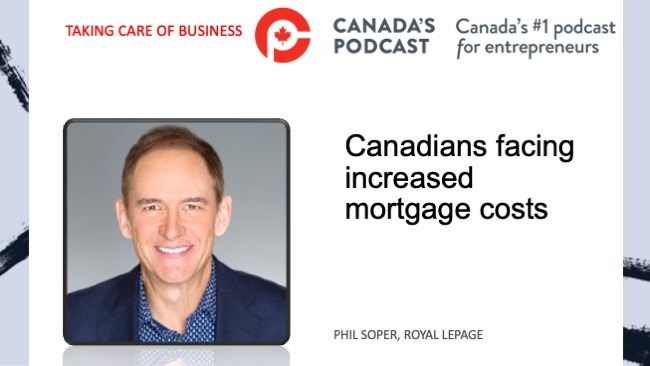In this video interview, Justin Knibbe, director, Master of Management and assistant professor, entrepreneurship and innovation, Haskayne School of Business, University of Calgary, discusses some new research about how Canadians feel when it comes to thinking about career change in their lives.

Justin Knibbe
PRESS RELEASE
Calgary, AB – They say the only constant in life is change, and there’s no doubt Canadians have endured their fair share of change over the past few years – a global pandemic, rising inflation and the great resignation and subsequent quiet quitting to name a few. However, despite all these major societal shifts, Canadians’ appetite for change remains strong. A recent study commissioned by the Haskayne School of Business at the University of Calgary found that when Canadians were asked to select their three top reasons for making a career change their number one motivator was financial growth at 73 per cent. Calgarians place even more emphasis on seeking monetary advancement with 80 per cent stating it as their top determinant.
However, money isn’t the only motivator on Canadians’ minds, as they ranked work/life balance as a narrow second at 66 per cent respectively. Its close selection to financial growth signals the growing priority Canadians place on achieving greater flexibility in the workplace, which could be largely motivated by the hybrid work models adopted during the pandemic.
“Seeing finances and work/life balance as top career change motivators over factors like workplace culture, career outcomes and value alignment shows that people are strongly reconsidering the role their career plays in their life and overarching identity. Many are leveraging the pandemic as an opportunity to reset and fully explore their underlying passions, which we’re seeing through both an increase in interest for graduate business education and in a surge of entrepreneurial activity. Those who are feeling stuck in their current careers are much more willing to make a change and position themselves at the forefront of major industry transformations, which we are seeing through the growth of technologies like AI and clean energy.”
Justin Knibbe, director, Master of Management and assistant professor, entrepreneurship and innovation, Haskayne School of Business
The survey findings indicate Canadians’ attitudes toward career change is complex. The feelings Canadians associate with career change are relatively universal with uncertainty (50 per cent), hesitancy (40 per cent) and anxiety (34 per cent) ranking as the top three emotions they identify with this type of life change – regardless of demographics. The results also revealed that career changes are more anxiety inducing for young people, but they are also far more exciting.
When it comes to the role graduate business education plays in one’s career trajectory, one in four Canadians stated they would consider enrolling in this type of program to help them achieve a career change. According to the 2021 Census, currently only 9.3 per cent of Canada’s population holds a graduate degree, compared with a range of 13 to 15 per cent elsewhere in the G7, so this finding presents the potential for an uptick in Canadian graduate studies.
Most surprisingly, when evaluating the industry backgrounds of those respondents who expressed interest in graduate business education, the results illustrated that the study of business is expanding well beyond traditional industries like finance. In fact, the top industry sectors interested respondents represent include construction (45 per cent), personal services (42 per cent), hospitality/tourism (41 per cent) and manufacturing (40 per cent). Additionally, reported interest in pursuing a graduate business education to achieve career change is much more common for those under 29.

Jim Dewald
“There’s no doubt the graduate business education landscape is changing, and at Haskayne, this is something we’re excited to embrace. The business world is evolving, and today, employers are seeking candidates who have well rounded, hands-on experience, strong leadership capabilities and deep critical thinking skills so they can actively contribute to solving some of our world’s most complex business problems. To see more Canadians from non-traditional business backgrounds, express an interest in business education is critically important as it allows us to build a prosperous future through a competitive, inclusive and sustainable economy rich in diverse perspectives and expertise.”
Dean Jim Dewald, Haskayne School of Business
Having launched two graduate business programs in recent years – Master of Management and Doctor of Business Administration (DBA) – Haskayne is seeing strong demand from prospective students interested in building on their educational experience and adding business to their repertoire. Haskayne’s Master of Management program has experienced a 168 per cent increase in enrollment since its inception in 2019, and Haskayne’s DBA has reached a total number of 40 students in the program with its first cohort of students graduating in June.
The Haskayne School of Business continues to advance on its pursuit of achieving top-tier business school status with the recent opening of its new business building, Mathison Hall which adds a dozen tech-enhanced classrooms to Haskayne’s scope, while also boasting new spaces for study and collaboration, as well as a heightened focus on work integrated learning opportunities.
As Canadians look to redefine their careers and make big life changes, the Haskayne School of Business is also embodying change with the unveiling of its new contemporary visual identity. After more than five decades in operation, the business school has decided to evolve its brand to realign with its refined value proposition and better convey what Haskayne truly represents – a place for transformative change. Consistently ranked as one of the best business schools in Canada, Haskayne offers a competitive undergraduate program, as well as four industry-leading graduate programs: Master of Management (MMgmt), Master of Business Administration (MBA), Executive MBA and Doctor of Business Administration, allowing Canadians at any life stage or level of experience the opportunity to build on their business knowledge and leadership skills.
To learn more about Haskayne’s business degree programs, visit haskayne.ucalgary.ca/future-
About the Research
The results above are based on a survey conducted by Abacus Data of 2,600 Canadians aged 18 and over (including an oversample to n=750 Alberta residents), from March 2 to 4, 2023. The margin of error for a comparable probability-based random sample of the same size is +/- 1.92%, 19 times out of 20. The data were weighted according to census data to ensure that the sample matched Canada’s population according to age, gender, and region.
 (Mario Toneguzzi is Managing Editor of Canada’s Podcast. He has more than 40 years of experience as a daily newspaper writer, columnist, and editor. He worked for 35 years at the Calgary Herald, covering sports, crime, politics, health, faith, city and breaking news, and business. He works as well as a freelance writer for several national publications and as a consultant in communications and media relations/training. Mario was named in 2021 as one of the Top 10 Business Journalists in the World by PR News – the only Canadian to make the list)
(Mario Toneguzzi is Managing Editor of Canada’s Podcast. He has more than 40 years of experience as a daily newspaper writer, columnist, and editor. He worked for 35 years at the Calgary Herald, covering sports, crime, politics, health, faith, city and breaking news, and business. He works as well as a freelance writer for several national publications and as a consultant in communications and media relations/training. Mario was named in 2021 as one of the Top 10 Business Journalists in the World by PR News – the only Canadian to make the list)
About Us
Canada’s Podcast is the number one podcast in Canada for entrepreneurs and business owners. Established in 2016, the podcast network has interviewed over 600 Canadian entrepreneurs from coast-to-coast.
With hosts in each province, entrepreneurs have a local and national format to tell their stories, talk about their journey and provide inspiration for anyone starting their entrepreneurial journey and well- established founders.
The commitment to a grass roots approach has built a loyal audience with over 120,000 downloads and thousands of subscribers on all our social channels and YouTube. Canada’s Podcast is proud to provide a local, national and international presence for Canadian entrepreneurs to build their brand and tell their story.





